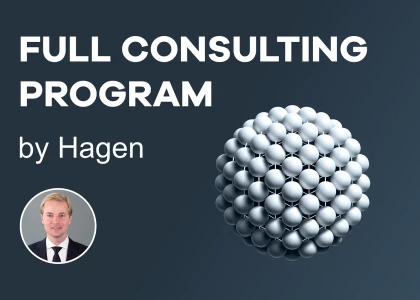Hi All,
Does anyone have any experience of doing a sourcing related case study in interviews at Alix Partners?
Would be keen:
1. Hear about your experience
2. Learn from it
3. Leverage off any resources you may have or may be aware of.
Alix Partner - Sourcing Case Study


Hi there,
First of all, congratulations on the invitation from AlixPartners!
I would be happy to share my thoughts on your question:
- First of all, although I do not know for sure, sourcing cases are most likely focused on procurement cost optimization, supplier negotiation and operational efficiency. Therefore, I would advise you to familiarize yourself with key procurement concepts.
- Moreover, depending on your background, please keep in mind that AlixPartners may not require you to have more than a basic understanding of procurement. Therefore, it is most likely more important to be good at solving case studies in general than to be an expert in procurement.
You can find more on this topic here: How to succeed in the final interview round.
If you would like a more detailed discussion on how to best prepare for your upcoming AlixPartners interviews, please don't hesitate to contact me directly.
Best,
Hagen

Hi,
I have had some candidates applying for AlixPartners. You can expect a typical case and fit part. The case part covers a wide range of industries (like mentioned on their website). The preparation is very similar compared to preparing MBB interviews.
Feel free to reach out if you require further assistance.
Mattijs


I haven’t personally done a sourcing case at AlixPartners, but from what I’ve heard, they focus a lot on cost analysis, supplier negotiations, and optimizing procurement strategies. It’s worth practicing structuring your approach clearly—think about key cost drivers, supply chain efficiencies, and risk mitigation. If you can, try working through real-world examples or casebooks from consulting prep platforms.

Hi there, sourcing case studies at AlixPartners usually test your ability to break down procurement challenges, identify key cost drivers, and develop actionable recommendations, so even if the case seems new, the underlying skills are the same as in any consulting role; drawing on experiences from various top firms, I've seen that success comes from having a structured approach, solid data analysis, and clear communication of your insights, which is why reviewing procurement frameworks, cost reduction strategies, and vendor negotiation techniques can be very beneficial—feel free to reach out if you have any more questions or need further advice! 😊
Alessa

Hi there,
The process and interviews are like for most other firms. Focus on case and fit.
In terms of case interview content:
Focus on learning how to case, not on specific industries or types of problems!
The key reason why candidates fail their case interviews and don't improve with practice is because they never learn the right approach and techniques to begin with. They might go through 30-40 cases, just repeating the same mistakes over and over again. There is often no strong baseline.
Make sure you understand and learn the basics for each part of the case (structuring, charts, math), which is
A replicable step-by-step for each part of the case interview
The right thinking techniques around the individual parts (e.g., what's a framework, what is evaluated, how can I ensure I think about it the correct way, what are some shortcuts to get to the answer quickly, etc.)
Simple communication templates to help you communicate your insights as well as ask for data in the right way to drive the case forward
- There are several approaches you can take, such as hiring a skilled coach, reading the right materials, or enrolling in relevant courses. I also have a book that provides direct guidance tailored to modern case interviews. It covers all the essential points mentioned here, and more, while also offering a detailed preparation plan. You can find it on Amazon
Avoid generic advice and framework memorization approaches. This will only hurt your performance and waste a ton of time (why -> check out the first post here: https://www.preplounge.com/en/consulting-forum/how-goodrelevant-is-the-case-in-point-book-for-case-prep-1984)
Once you have that baseline it's time to practice and internalize the skills to create the right profile, polishing your strengths and lifting your weaknesses to a robust-enough level
- Practice drills alone (structure, chart, math) and practice full cases with other excellent candidates that know the right habits and approach. It is crucial that you are practicing with really good peers, otherwise, it's a waste of time. Practicing drills on your own is a huge effectivity and efficiency booster since you can go over many more questions in a shorter amount of time compared to practicing with peers. Do both in parallel! You want to spend your time where it is most useful, e.g., if you struggle with math focus on math drills, etc.
Focus on quality over quantity. Doing 50+ cases does not mean much if you are not applying the right habits to score high and do a detailed debrief after every case to improve. You want to move from bad to good for your weaknesses and good to great for your strengths --> use the feedback from your previous experience and tailor your prep accordingly
Consider booking at least an initial coaching session to get a detailed and objective evaluation of your performance + learn the right habits for every case regardless of context and framework + get a tailored preparation plan out of the session that will set you up for an effective and efficient prep.
It does not hurt to focus a bit more on the relevant industries of your interviewer but chances are that not every case will be from that niche!
- Don't forget the fit interview part. Prepare answers for all the typical fit questions and stories (3-5 hours) and rehearse them a couple of times (5 hours)
All the best,
Florian

Hey there,
I actually have had a couple of coachees in the Alix Partner recruiting process! I'd be happy to share insights. Please feel free to DM me
But for the most part, it is not too different from other management consulting firms. They do a candidate led interview style approach too with a particular focus on procurement, cost optimization and operations
All the best

You should study strategies to optimize procurement costs. Case will touch on those topics.













